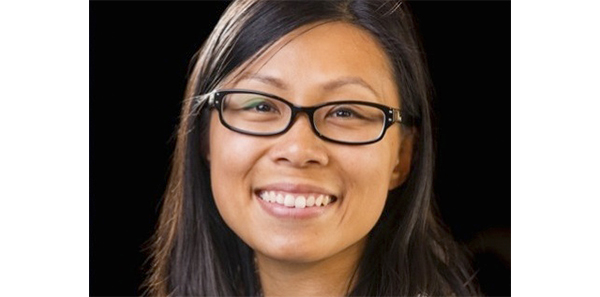1:30min

Optometrist Dr Bao Nguyen Photo: University of Melbourne
______________________________
By Helen Carter
Journalist
Lecture series on migraine and perimetry
Why optometrists should care about migraine, and perimetry developments to extend and complement optometric practice is the focus of a lecture series in Melbourne.
Postdoctoral research fellow in the University of Melbourne’s Department of Optometry and Vision Sciences, optometrist Dr Bao Nguyen, will provide evidence-based recommendations for managing patients with migraine who attend for eye care.
She says there are several reasons why migraines are of interest to optometrists and in particular, clinical tests of visual function for glaucoma diagnosis and monitoring can be confounded when there is a history of migraine.
Professor Algis Vingrys from the department will speak about new perimetry technology and test procedures developed on iPads including Melbourne Rapid Fields, a portable iPad perimeter he co-developed which is due for release this year.
Both will speak at the department’s Seeing Beyond Lecture Series 2017, which attracts six CPD points, from 6:30 pm to 8 pm on 5 April at the university’s School of Population Health, 207 Bouverie Street. Book here.
Melbourne reunions set for June
Twenty, 30 and 40 year reunion tours for former University of Melbourne optometry students are planned for June.
The University’s Department of Optometry and Vision Sciences will hold reunion tours for final-year classes from 1997 on 13 June, 1987 on 15 June and 1977 on 8 June.
The tours from 6 pm to 7:30 pm will include the teaching, research and clinical facilities of the department, and an opportunity to chat with current academic staff and catch up with peers.
Study seeks colour vision deficient patients
Adult patients with colour vision deficiencies, particularly those with a tritan defect, are needed to participate in a study on colour vision testing at UMeyecare.
For this and another trial, UMeyecare wants to compile a register of adults and children with significant colour vision deficiencies.
The current project by Clinical Research UMeyecare is the validation of a forced choice test for children based around the principles of the D15, a test originally devised by Dr John Parkes, the occupation health physician consulting at UMeyecare, to assess colour vision of very young children. Initial testing will be in adults before presenting the test to children.
For information email daryl.guest@unimelb.edu.au
OT sessions reduce depression
Occupational therapy reduces the rate and severity of depression in patients with central vision loss, a new study suggests.
Low vision patients who improved in daily functions such as cooking, reading mail or using a computer, through at-home training with an occupational therapist, had less severe symptoms of depression than those who did not train with an occupational therapist.
Those who received occupational therapy met with an occupational therapist for six one-hour sessions in their homes and were taught how to use magnifying glasses, electronic devices and computer programs.
Eye health supplements to exceed $2 billion
More than US$2.85 billion worth of eye health supplements will be sold globally by the end of 2024, a new report predicts.
Persistence Market Research’s report predicted that demand for supplements containing antioxidants, lutein and zeaxanthin will remain high, and more than two-thirds of supplements will be used for AMD.
A sample of the report is available on request.
Indigenous eye facts
Australian Indigenous HealthInfoNet launched its annual publication, the Overview of Aboriginal and Torres Strait Islander health status 2016 on national Close the Gap Day.
The report, which includes a section on eye health, and PowerPoint presentations of key facts are available for free download.
Ocular oncology conference
The world’s leading eye cancer experts will be in Sydney on 24-28 March for the International Society of Ocular Oncology’s Biennial Conference.
More than 400 eye health professionals are expected to attend the conference, hosted by the Royal Australian and New Zealand College of Ophthalmologists’ NSW Branch which is also hosting its annual scientific meeting.
The meetings will focus on ocular oncology and oculoplastic surgery including developments in eye cancer management, specifically intra and extraocular tumours, and sessions will explore the relationship between eye cancer and sun exposure, particularly in countries with high UV levels.